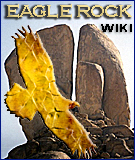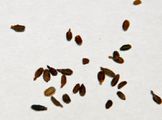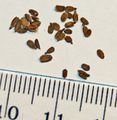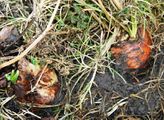Carrot
Carrots like any soil but rocks will deform them. They also don't like and don't need compost or manure. I always sow them in a field that was composted the year before and where another crop has grown on that compost. They grow well even in soils that are so poor that most other crops won't develop.
Sow summer carrots from February to the end of June. Winter carrots from March to May. Add wet sand to the seeds and keep them a few days like this, then sow the seeds together with the sand. The sand helps you sow regularly and the moist seeds germinate faster. Sow ca 2 cm deep. To find back the line (carrots grow very slowly during the first month or so), you can add some radish seed. I usually plant bulb onions in the lines, each one or two hand widths an onion. This also shows the line and it prevents carrot flies from damaging your crop.
After a few weeks you need to thin the small plants; give winter carrots a bit more space.
Carrots are said to be useful companion plants for tomatoes as they increase tomato production. I haven't tried this out yet.
Carrots grow best in full sun but tolerate some shade.
Carrots tolerate some frost. I usually keep them outside under a sheath of hay until it begins to freeze continually. Dig them out and store the roots without the leaves covered with clean sand in a box in a cellar or other cool place.
Carrot flies
- Carrots can be affected by carrot flies. Crop damage is caused by the up to 10 mm long larvae (maggots) feeding on the outer layers of the carrot root. Onions can be affected by onion flies which resemble houseflies. They lay their eggs in groups on the shoots, leaves and bulbs of host plants and on the ground nearby. The larvae create large cavities in bulbs. But onion flies don't seem to like the smell of carrots and carrot flies don't like onions. So onions and carrots make perfect companion plants. I always plant bulb onions in the lines of carrot seeds, each one or two hand widths an onion. I've never had problems with either carrot flies or onion flies but heard of many gardeners who had this problem. This method also has the advantage that you can see where you sowed the carrots. Carrots take long to germinate but bulb onions sprout fast.
Carrots and a soil that is too hard
Carrots grow long when they have to go deep to get their minerals from the soil. If they get too many nutrients in the top layer of the soil, they can get lazy and they also are more easily affected by worms or other types of crawling animals in the soil. Also when there are too many rocks in the soil, or when the soil is too hard, carrots don't make long roots.
If your soil is too hard, i would advise deep digging the soil and adding much mature compost (not a very nitrogen-rich compost, better is a meager compost with much straw), or mulching the soil with a thick layer (at least one foot thick). But this composting or mulching should be done in the year before you sow the carrots. You can grow another crop that year, for example pumpkins can grow in the mulch and compost. Then, before you sow the carrots, remove all the mulch and organic material that is still on top of the soil, or your carrots might get affected by pests for carrots that thrive in the organic material.
Basically, carrots don't need compost or fertilizers, but they do need a soil that is made loose also in the deeper layers. I never fertilize the soil in the year in which i grow the carrots.--JE 21:31, 16 June 2012 (PDT)
Gallery
Winter carrot and a left-over onion after frost in winter. They both seem undamaged.







